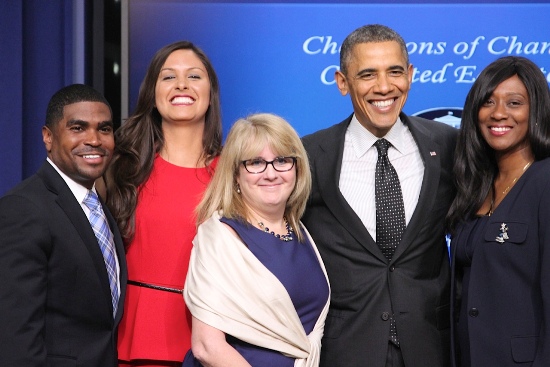Advice from a Changemaker: Let’s All Get Connected | Project Advocacy

“Champion of Change” Carolyn Foote (center) and President Barack Obama flanked by co-honorees (l. to r.) S. Dallas Dance, Misa Gonzales, and Daphne Bradford. Photo by Joanne Foote.
Our president believes that libraries should be connected. “In an age when the world’s information is just a click away, we’ve got to bring our schools and our libraries into the 21st century,” President Obama said in a ceremony honoring 10 educator Champions of Change in November 2013. As a grateful recipient of that award—and the sole school librarian in the group—I feel even more inspired to bring librarians and educators together online. The president’s remarks demonstrated powerful support for school libraries and their role in connecting students. We must be advocates of that message and show that we can lead our schools in providing students’ online experiences. That means being proficient in this area.
Are school librarians online? A Library Research Service study of Colorado public school librarians in 2011–2012 showed that, while Colorado school librarians used websites, only 27 percent used blogs, and only six percent used Twitter. Yet a Pew Internet survey found that 24 percent of teens are on Twitter, and that number is growing—in addition, eight in ten teens have Facebook profiles. To teach information literacy, let’s engage in the tools our students are using.
As a Champion of Change, I’m going to champion one here. My challenge: make a commitment to get connected, if you aren’t already. Join the vibrant library community on Twitter or Google Plus. Most of us are singletons in our jobs. Join to learn new teaching ideas, discover new books, and better understand the tools your students use.
How do you start? Consider finding a mentor to guide you, whether you’re getting up to speed on Twitter, Facebook, Google Plus, Instagram, Edmodo, or something else. Be prepared for a learning curve. Don’t let fear stop you—fear of failure is sometimes fear of embarrassment.
Here are some suggestions for participating, depending on your focus. #kinderchat is a lively discussion Monday evenings about elementary education. Follow @yalsa for info on YA lit, or @nancyjolambert to hear a K–5 librarian share her enthusiasm for edchats and conferences. @buffyjhamilton covers information literacy and other issues important to high school librarians. @sljournal, SLJ’s own Twitter feed, is full of research information, useful links, and news. The more you explore the handles and hashtags out there, the more you’ll learn.
Is time an obstacle? You don’t have to be constantly on the Internet to benefit from the online community. Tune into a live Teacher Librarian (TL) Virtual Café event once a month—or join #tlchat on Twitter every second Monday. If you’re worried that you have nothing to say, don’t. All of us have knowledge to share and can continually learn from the “collective librarian brain.”
For those already networked, commit to helping three novices get connected next month and mentor them. Introduce them to your colleagues online, including teachers and administrators—not just librarians. President Obama’s ConnectED initiative aims both to wire schools and to support training initiatives so educators can “keep pace with changing technological and professional demands,” he said.
Whether we call ourselves “book people” or “tech people,” we must be “student people” first. That means doing what’s best for our students, who are heading into a completely wired world after they leave school. It means putting personal preferences aside when needed.
Listening to the president confirmed my conviction about our responsibility to prepare our students. Being online is not about preserving our jobs or proving our worth. It’s about being the best we can be at our profession. If we glean new ideas online, learn about opportunities, and stay current on best practices, we can truly lead our teachers and students—and advocate for our profession.
Join me in this challenge. Let’s champion some change!
RELATED
The job outlook in 2030: Librarians will be in demand
The job outlook in 2030: Librarians will be in demand
ALREADY A SUBSCRIBER? LOG IN
We are currently offering this content for free. Sign up now to activate your personal profile, where you can save articles for future viewing






Add Comment :-
Comment Policy:
Comment should not be empty !!!
Darren Draper
This reminds me of a conversation we had back in 2009. http://blogs.slj.com/neverendingsearch/2009/04/30/on-the-librarian-whats-the-point-the-twitter-conversation/ Apparently we still have a long way to go?Posted : Jan 22, 2014 04:21